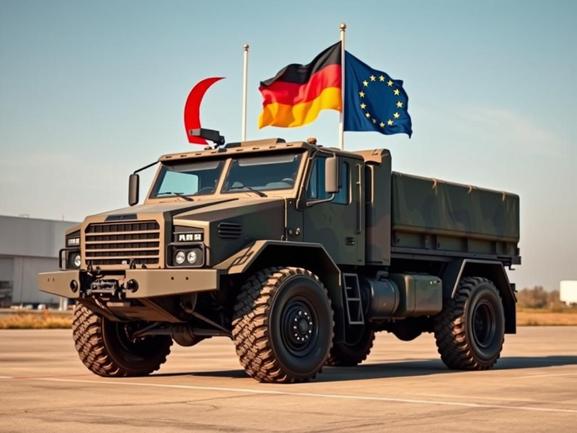In the wake of shifting geopolitical currents and an undeniable surge in defense consciousness across Europe, nations are re-evaluating their security architectures and procurement strategies. A significant theme emerging from this introspection is the imperative of strategic autonomy – the capacity for European states to act independently in matters of defense and security, reducing reliance on external powers for critical capabilities. This pursuit isn’t merely theoretical; it’s driving tangible shifts in industrial policy and cross-border collaboration. Against this backdrop, the reported teaming of France’s Arquus and Germany’s Daimler Truck to bid for a French military truck contract encapsulates the convergence of national defense needs and a burgeoning European industrial ambition.
The partnership between Arquus, a key player in French military vehicle manufacturing, and Daimler Truck, a global automotive giant with a significant European footprint, is strategically noteworthy. Arquus brings specialized knowledge of the French defense requirements and a production base firmly rooted within France. Daimler Truck contributes extensive experience in large-scale vehicle manufacturing, advanced technological capabilities, and a robust supply chain. Their combined offering aims to leverage the strengths of both entities: Arquus’s deep understanding of military specifications and in-country support needs, coupled with Daimler’s prowess in engineering, efficiency, and potentially scale. The emphasis on production sites located domestically in France for Arquus and near the French border in Germany for Daimler Truck underscores a deliberate alignment with the sovereignty narrative currently prevalent in European defense discussions.
Examining the broader context, the timing of this collaboration is no coincidence. Increased defense spending across Europe, partly spurred by events in Eastern Europe, creates a fertile ground for defense manufacturers. However, this isn’t simply about spending more; it’s about spending more *strategically*. Governments are under pressure to ensure that significant investments in military hardware translate into enhanced security *and* contribute to the national or European industrial base. The Arquus-Daimler bid directly addresses this dual objective. By presenting a Franco-German solution, they are pitching not just trucks, but a narrative of European capability and independence. This could be particularly appealing to Paris, which has long championed the idea of European strategic autonomy, especially in critical sectors like defense equipment.
Furthermore, such cross-border industrial partnerships within the European Union signal a potential shift towards greater integration or at least coordination in defense procurement. Historically, national interests and disparate requirements have often hampered large-scale European defense projects.
“The challenge lies in harmonizing diverse national needs while building a cohesive, competitive European defense industrial base.”
Collaborations like the one between Arquus and Daimler Truck could serve as models, demonstrating how companies can bridge national boundaries to create competitive offerings that meet modern military demands while reinforcing the European industrial commons. This approach might mitigate some of the inefficiencies associated with purely national procurement programs and foster greater interoperability among European forces in the long run. It’s a complex undertaking, navigating different regulatory environments, technical standards, and national priorities, but the potential benefits in terms of scale and shared technological advancement are significant.
However, the path ahead is not without obstacles. The defense procurement landscape is intensely competitive. While the emphasis on European sovereignty provides an edge, the bid will still need to compete on factors like cost-effectiveness, operational capability, technological sophistication, and through-life support against other potential bidders, who could include purely national champions or partnerships involving non-European firms. The success of the Arquus-Daimler venture hinges on their ability to demonstrate a compelling value proposition that satisfies France’s specific operational requirements while also offering the political and industrial advantages of a strong European partnership. The long-term sustainability and upgradeability of the proposed vehicles will also be critical considerations for the French Ministry of Armed Forces.
In conclusion, the Arquus-Daimler Truck partnership for the French military truck tender is more than just a commercial bid; it is a microcosm of the larger trends shaping European defense today. It reflects the renewed commitment to defense spending, the strategic imperative of sovereignty, and the potential for cross-border industrial collaboration to build a more resilient European defense capacity. The outcome of this specific tender will be telling, not only for the companies involved but as an indicator of how serious European nations are about translating the rhetoric of strategic autonomy into concrete procurement decisions that favor European industrial champions. It leaves us pondering: will this partnership pave the way for deeper integration in defense manufacturing, or will national interests ultimately continue to dictate procurement outcomes?
